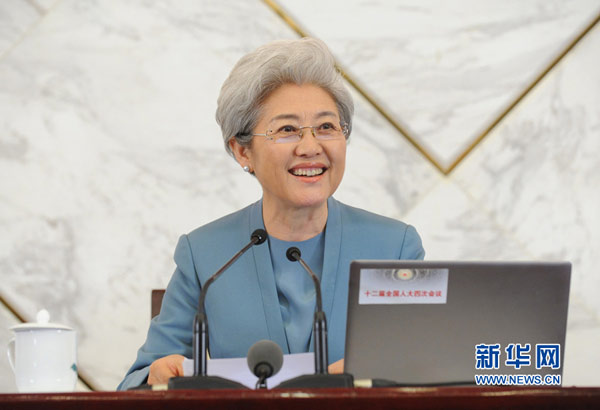 |
|
Fu Ying, spokesperson for the fourth session of China's 12th National People's Congress (NPC), answers questions during a press conference on the session at the Great Hall of the People in Beijing on Friday. The fourth session of the 12th NPC is scheduled to open on Saturday. [Photo/Xinhua] |
LI JIANGUO, vice chairman of National People's Congress Standing Committee, introduced the draft of China's first charity law to the national legislature on Wednesday. The draft marks a significant development of philanthropy in China as it provides stipulations on how charities should be registered and operate, People Daily said on Thursday:
As China enters a new historical period and is endeavoring to achieve broad and profound social and economic development, the draft charity law aims to establish a comprehensive system to regulate philanthropy in the country, so it helps eliminate poverty and contributes to achieving the goal of building a moderately prosperous society. In order to establish a comprehensive system for charitable activities, the law covers the management of social organizations and individuals, and is based on the reality of the country and international experience.
The draft law defines charity as "bigger philanthropy". Historically, charity was only defined in relation to poverty, and was complementary to national poverty alleviation efforts. Now charity has expanded to education, healthcare, culture, sports, environmental protection and social services, and the development of philanthropy and society are organically combined.
Within the framework of the draft law, charity will become an important agent promoting national development. According to the experience of the international community, if proactive policies promote the development of charitable activities, employment in this area could reach 10 percent of the working population, while the number of volunteers could exceed 40 percent. More importantly, charities will provide a large number of people-oriented services.
There are some concerns that the law will impose restrictions on charities. In fact, the purpose of the legislation is to encourage rather than limit charitable activities.

I’ve lived in China for quite a considerable time including my graduate school years, travelled and worked in a few cities and still choose my destination taking into consideration the density of smog or PM2.5 particulate matter in the region.
